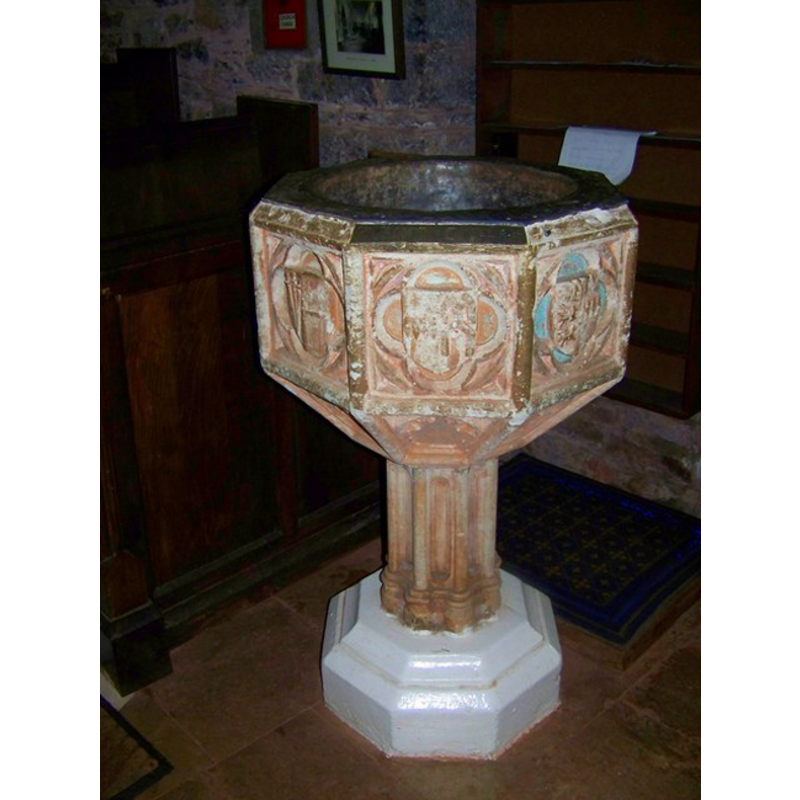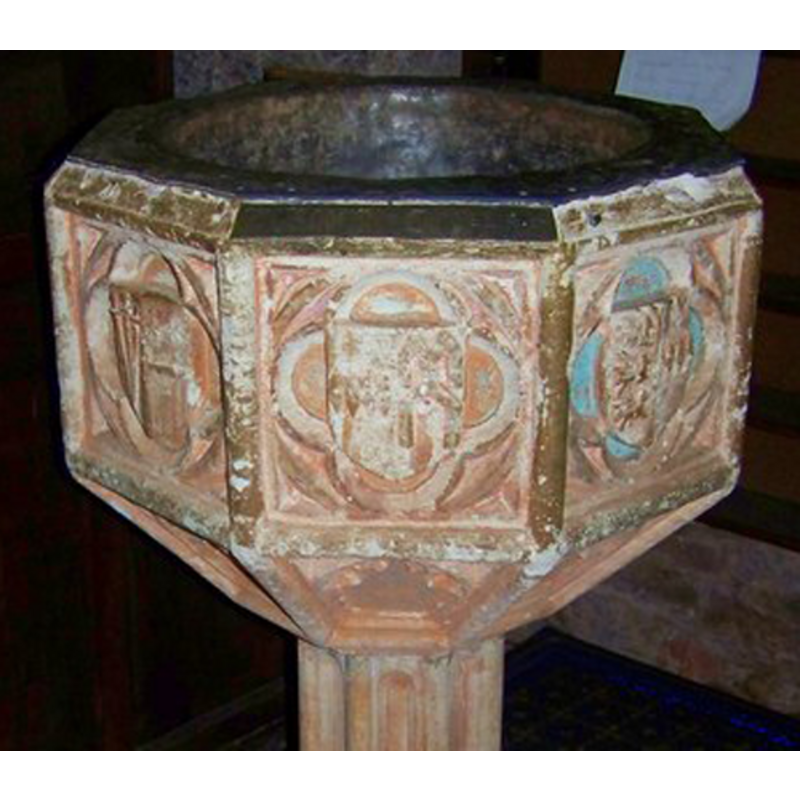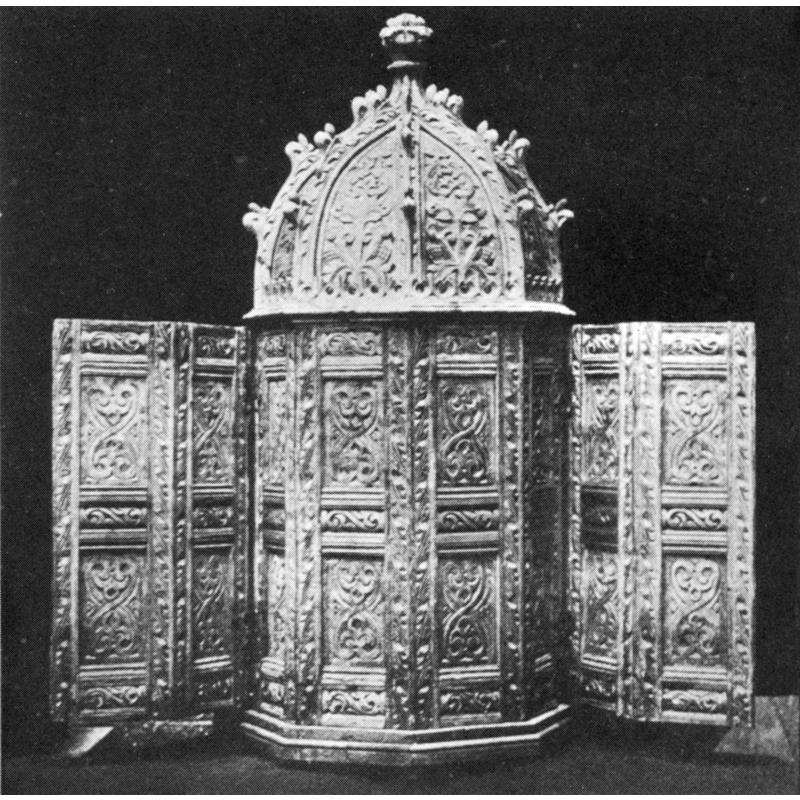Cockington

Image copyright © Trish Steel, 2008
CC-BY-SA-3.0
Results: 5 records
B01: symbol - shield - coat of arms - Cary family (with Cary, Carew, Dinham and Paulet)
Scene Description: "The panels of the font show the alliances of the Cary family: Cary, Carew, Dinham, and Paulet" [cf. Font notes] -
Copyright Statement: Image copyright © Roger Peters, 2005
Image Source: Roger Peters [www.wissensdrang.com]
Copyright Instructions: Permission received (email of 9 January 2005)
view of font
Copyright Statement: Image copyright © Trish Steel, 2008
Image Source: digital photograph taken 18 August 2008 by Trish Steel [http://www.geograph.org.uk/photo/944245] [accessed 16 January 2009]
Copyright Instructions: CC-BY-SA-3.0
view of font and cover
Copyright Statement: Image copyright © Roger Peters, 2005
Image Source: Roger Peters [www.wissensdrang.com]
Copyright Instructions: Permission received (email of 9 January 2005)
view of basin
Copyright Statement: Image copyright © Trish Steel, 2008
Image Source: detail of a digital photograph taken 18 August 2008 by Trish Steel [http://www.geograph.org.uk/photo/944245] [accessed 16 January 2009]
Copyright Instructions: CC-BY-SA-3.0
INFORMATION
Font ID: 01074COC
Object Type: Baptismal Font1
Font Date: 1485? / pre-1540?
Font Century and Period/Style: 15th - 16th century, Perpendicular
Workshop/Group/Artisan: heraldic font
Cognate Fonts: similar font in Devon at Dunsford -- related cover at Bramford, Suffolk [cf. Stabb, in FontNotes]
Church / Chapel Name: Parish Church of St. George and St. Mary
Font Location in Church: Inside the church
Church Patron Saint(s): St. George & St. Mary
Church Address: Cockington Village, Torquay TQ2 6XA, United Kingdom -- Tel.: +44 1803 606230
Site Location: Devon, South West, England, United Kingdom
Directions to Site: Located on the A3022, in the SW suburbs of Torquay
Additional Comments: recycled - restored font cover [cf. FontNotes] / painted font
Font Notes:
Click to view
Described in Lysons (1806-1822) as a baptismal font "octagonal, ornamented with coats of arms." Lewis' Dictionary of 1848 mentions simply "an octagonal font". Wilson's Gazetteer (1870-72) notes: "a very anciant octagonal font". Stabb (1908) writes: "The font [...], of Caen stone, is octagonal in shape, and dates from 1540. It bears a mutilated inscription on brass in Old English letters: -- Robert Cary Armigeri E-- The following 't' of ET is missing. He died June 15th 1540, and is buried in Clovelly Church. The date on the font is March 2nd, but the date of the year is broken and lost. It is possible that the font was the offering of William Cary, who was Lord of the Manor of Cockington, as well as possessed of large property in North Devon. The panels of the font show the alliances of the Cary family: Cary, Carew, Dinham, and Paulet. The handsome cover is not the original one, this may have been destroyed by the iconoclasts who destroyed the rood loft. The present cover, of Elizadethan or Jacobean date, was found by the present vicar in pieces and much decayed, the top being lost. It was restored carefully and decay arrested. The carving is of the Elizabethan domestic pattern type, and the material is pine wood. The top is modern, but is copied from an old font cover at Bramford in Suffolk. The original hinges are preserved. The work of restoration was carried out by Harry Hems, of Exeter, about eight years since (ca. 1901), for the present vicar, the Rev. J. Henning." Bond (1908) mentions that "brass letters occur on a font at Cockington, Devon" and lists the font cover as Jacobean. The interesting cover and surrounding structure, as can be seen in both Stabb's and Bond's illustrations, is a profusely decorated octagonal armoire topped with an also octagonal hemispheric dome with cusped angles and a rose (?) finial; a double panel swings open on each side giving access to the font inside. [cf. Index entries for other rim-buffet font covers of the period]. Noted in Pevsner (1952): "Font. C15, slim pillar, wide octagonal bowl with quatrefoil and heraldic decoration."
Credit and Acknowledgements: We are grateful to Dr. Roger Peters, of www.wissensdrang.com, for his permission to use the transcription of and images from Stabb (1908).
COORDINATES
UTM: 30U 459942 5590345
Latitude & Longitude (Decimal): 50.46373, -3.5644
Latitude & Longitude (DMS): 50° 27′ 49.43″ N, 3° 33′ 51.84″ W
MEDIUM AND MEASUREMENTS
Material: stone, type unknown
Font Shape: octagonal, mounted
Basin Interior Shape: round
Basin Exterior Shape: octagonal
Drainage System: centre hole in basin
Drainage Notes: lead-lined
INSCRIPTION
Inscription Location: on a brass plate attached to the font
Inscription Text: "ROBERT CARY ARMIGERY E[t ... march 2nd]"
Inscription Notes: [cf. FontNotes]
Inscription Source: Stabb (1908-1916) -- Bond (1985 c1908)
LID INFORMATION
Date: 17th century
Material: wood, pine
Apparatus: no [rim-buffet type]
Notes: [cf. FontNotes]
REFERENCES
- Bond, Francis, Fonts and Font Covers, London: Waterstone, 1985 c1908, p. 115, 289 and ill. on p. 304
- Cram, Ralph A., Church Building: a Study of the Principles of Architecture in their Relation to the Church, Boston, MA: Small, Maynard & Co., 1914, pl. 69, p. 112
- Lewis, Samuel, A Topographical Dictionary of England, Comprising the Several Counties, Cities, Boroughs, Corporate and Market Towns, Parishes, Chapelries, and Townships, and the Islands of Guernsy, Jersey, and Man, with Historical and Statistical Descriptions [...], London: S. Lewis, 1831, [www.british-history.ec.uk/report.asp?compid=50888] [accessed 24 January 2007]
- Lysons, Daniel, Magna Britannia, being a concise topographical account of the several counties of Great Britain, London: Printed for T. Cadell and W. Davies, 1806-1822, vol. 6: p. cccxxxi
- Paley, Frederick Apthorp, Illustrations of Baptismal Fonts, London, UK: John van Voorst, 1844, p. 27
- Pevsner, Nikolaus, South Devon, Harmondsworth: Penguin Books, 1952, p. 83
- Stabb, John, Some old Devon churches, their roods, pulpits, fonts, etc., London: Simkin, [et al.], 1908-1916, p. 62 and pl. 62c
- Wilson, John Marius, Imperial Gazetteer of England and Wales: embracing recent changes in counties, dioceses, parishes, and boroughs [...], Edinburgh: A. Fullarton & Co., 1870-1872
!["The panels of the font show the alliances of the Cary family: Cary, Carew, Dinham, and Paulet" [cf. Font notes] -](/static-50478a99ec6f36a15d6234548c59f63da52304e5/compressed/1050113033_compressed.png)

